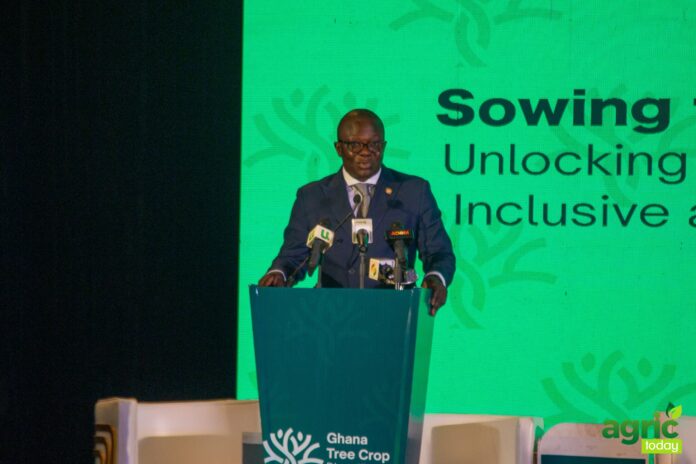The Minister of Food and Agriculture, Dr. Bryan Acheampong, has said that Ghana’s Tree Crop Sector is vital to agriculture and the economy growth, affirming that the sector is generating income of over 1.6 million farming households, including commercial producers beyond cocoa.
He stated that the sector offers significant opportunities for economic diversification, job creation, poverty reduction, food security, foreign exchange earnings, and a substantial contribution to Gross Domestic Product (GDP).
The Minister made this revelation during the launch of the Ghana Tree Crop Diversification Project on November 14, 2024, at Kempinski Hotel, Accra.
The Minister of Food and Agriculture, who doubles as the Member of Parliament for Abetifi Constituency, Dr. Bryan Acheampong indicated that despite Ghana having ample arable land for cocoa production, it faces significant threats from deforestation, climate change, and other environmental issues, leading to a marked decline in suitable land.
“The sector also confronts challenges, primarily low productivity despite increased output. Poor coordination, limited technical capacity, and insufficient negotiating power hinder farmers’ effectiveness.
Additionally, awareness and adoption of climate-smart agriculture (CSA) among producers remain low”.
“There is growing concern over widespread child labor in cocoa and other agricultural sectors, although Ghana has enacted comprehensive child labor laws and made notable progress in reducing this issue,” Bryan Acheampong added.
He stated that to enhance tree crop development, the Government of Ghana will promote a dual strategy, focusing on cocoa and other strategic tree crops.
For the Cocoa Sector, the Minister said that the Cocoa Board (COCOBOD) has implemented its second Cocoa Sector Development Strategy (CSDS-II) for 2017-2027.
This new strategy will address the shortcomings of the first strategy, which primarily aimed at increasing productivity but failed to adequately tackle Cocoa Swollen Shoot Virus Disease (CSSVD) and lacked management information systems.
He affirmed the CSDS-II focus, hammering on modernizing the industry to improve competitiveness and resilience, with interventions aimed at enhancing productivity, efficiency, innovation, and quality management, along with traceability and certification.
He again indicated the plan for the other Tree Crops, stating that in 2019, the Government established the Tree Crops Development Authority (TCDA), which launched a five-year development strategy in 2022 targeting six priority crops: cashew, shea, mango, coconut, rubber, and oil palm.
This strategy aims to regulate and sustainably develop the production, processing, and trade of these tree crops and is articulated around four key strategic and operational areas: research support, production and value chain support including commercialization, capacity building, and licensing and regulation.He affirmed the government’s commitment to the project, stating that the Government of Ghana has secured a $200 million credit from the International Development Association (IDA) of the World Bank Group (WBG) to finance a six-year initiative called the “Ghana Tree Crop Diversification Project (TCDP).”
The Ghana Tree Crop Diversification Project (GTCDP) is managed by the Tree Crops Development Authority (TCDA) and the Ghana Cocoa Board (COCOBOD) under the supervision of the Ministry of Food and Agriculture (MOFA).
The Minister of Food and Agriculture highlighted the objectives of the project, affirming that it will support sector-wide activities, reforms, and investments in priority agro-ecological areas to maximize effectiveness.
The project will enhance the national institutional framework and governance of the tree crops sector for sustainable economic, social, and environmental outcomes.
Additionally, it will promote inclusivity by improving governance and management within the sector, with a focus on women and youth, while strengthening the capacity of key institutions.
“Leverage existing national institutions—such as MOFA, COCOBOD, TCDA, National Agriculture Research Institutions (NARIs), Ghana Export Promotion Authority (GEPA), and Ghana Investment Promotion Centre (GIPC)—to scale up ongoing initiatives in tree crop development,” Bryan Acheampong indicated.
Speaking on the beneficiaries of the project, the Minister of Food and Agriculture said the project will directly benefit cocoa, cashew, coconut, and rubber farmers, improving productivity and incomes for 52,775 farmers and their households.
“Approximately 40% of these beneficiaries will be women, located across 11 districts in six regions: Western North, Eastern, Savanna, Bono, Bono East, and Eastern”. He added.
Additionally, the project will support five to ten input suppliers and ten nurseries. Through matching grants, technical assistance, and improved access to markets, an estimated 185 small and medium-sized enterprises involved in processing cocoa, cashews, and coconuts will also benefit.
Indirectly, local communities and cooperatives will gain from enhanced institutional capacity, including better levy collection by TCDA and capacity building by COCOBOD, which will lead to improved research and development, child labor safeguards, and expanded market services.
The project is expected to create around 20,000 jobs at an investment of $4,200 per job, with a significant focus on employing women (60%) and engaging youth.
This initiative has the potential to transform the cocoa, cashew, coconut, and rubber value chains by connecting downstream and upstream actors.
Echoing the sentiment of the Minister of Food and Agriculture was the Chief Executive Officer (CEO) of the Tree Crops Development Authority, William Agyapong Quaittoo. The CEO also said that the tree-crop sector holds significant potential for economic diversification and sustainable transformation.
He indicated that historically, cocoa has been the major cash crop and a vital source of foreign exchange for Ghana for over a century.
However, the sector faces systemic challenges such as low productivity, poor quality of produce, price volatility, limited access to finance and markets, and an inadequate regulatory environment, all of which hinder competitiveness and sustainability.
He stated that despite these challenges, Ghana’s tree crops sector has considerable opportunities for growth and increased export revenue. To capitalize on this potential, the Government of Ghana established the Tree Crops Development Authority (TCDA) through Parliamentary Act 1010 in 2019.
“The TCDA is tasked with regulating and promoting sustainable production, processing, and trading of tree crops. Its aim is to create a highly developed, diversified, value-added, and globally competitive tree crops industry in Ghana. The priority crops outlined in Act 1010 include cashew, coconut, mango, oil palm, rubber, and shea,” the CEO said.
He noted that the Tree Crops Development Authority, as a regulatory body operating in a dynamic environment, has developed a five-year strategy and implementation plan (2022-2027) to address emerging challenges.
The plan emphasizes mobilizing resources through strategic partnerships with both the public and private sectors, as well as Ghana’s development partners, to strengthen the tree crop sector.
The strategy establishes a framework for transforming the tree crops industry, aligning with Ghana’s goal of inclusive economic growth.
He said that the strategy specifically focuses on promoting a sustainable supply chain through demand-driven research and development, value chain support, institutional capacity building to create sustainable systems, and an enabling policy and regulatory environment to attract private sector investment.
The Country Director, World Bank, Mr. Robert Taliercio O’Brien, also at the launch, stated that the project, co-designed by the Government of Ghana and the World Bank, focuses on diversification into tree crops with much emphasis on productivity and market access improvements; enhancement of private sector competitiveness in value addition and processing based on commodity market demand; as well as institutional strengthening and value chain governance, sustainable intensification approaches and planning; market scoping to identify buyers of certified cocoa; preparation of market contracting; assessment of private investment in post-harvest processes and infrastructure for value addition; and identification of financing mechanisms.
He said, “Through this project, the World Bank, with a US$200 million credit facility from the International Development Association (IDA), will support key value chains such as cocoa, cashew, coconut, and rubber, by providing critical resources, knowledge, and expertise.”
“These interventions aim to support the Government of Ghana’s efforts to diversify and grow the economy by modernizing agriculture, accelerating industrialization, and prioritizing climate resilience and mitigation.
They align with the objectives of the National Medium-Term Development Policy Framework (2022–2025) and the “Ghana Beyond Aid” reform agenda (2019–2028),” Mr. Robert Taliercio O’Brien said.
“The World Bank is proud to be a partner in this important initiative. Our long-standing commitment to Ghana’s development, particularly in the agricultural sector, aligns perfectly with the objectives of the GTCDP,” the Country Director highlighted.








